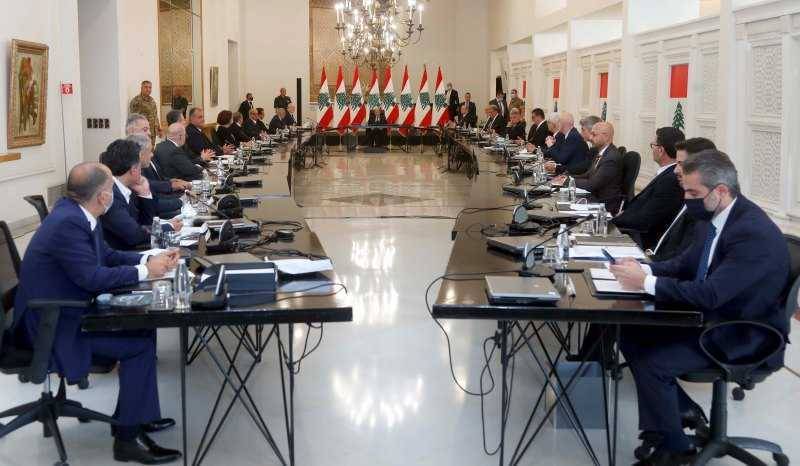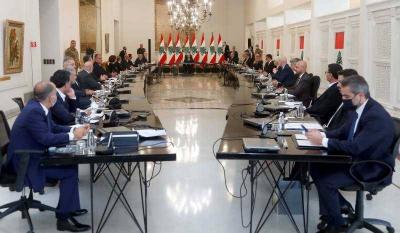Starting today, there are 48 hours marking the transition between two phases in post-Taif Lebanon, reflected in the results of the 2022 elections for a new parliamentary council, which will lead to either a continuation of the old or the formation of a new parliamentary presidency, and a new government, whether it continues the government of President Najib Mikati or takes a different form. This comes alongside the impending election of a new president after October 31, as President Michel Aoun announced he would not remain in Baabda for even a moment after this date.
The stakes are not just about changing or not changing the heads of state and constitutional institutions, but also about the direction of policies, trends, tools, and roles following the "big Sunday," which carries peculiarities in alliances and elections, and wonders in representation, regardless of voting rates and the nature of upcoming blocs in the 2022 Council.
As a result, the September government will close its files and depart following the formation of the new council announced for May 21, just a few days before the holiday of Resistance and Liberation, with a farewell session scheduled for next Thursday, holding onto the hope of a return. Information has circulated that the farewell session on May 19 (next Thursday) will be marathon-like and might hold surprises that remain under wraps.
Ministerial sources revealed to "Al-Liwa" that the penultimate cabinet session held yesterday discussed several topics outside the agenda. Discussions centered around various issues and agenda items, including the renewal of expired passports for participation in the parliamentary elections for a fee of 200,000 LBP. "Al-Liwa" learned that the President did not refuse to include the passport renewal item as reported, but rather the request came late, leaving insufficient time for it to be reviewed, and thus the President's non-objection was evident from its swift approval by the Cabinet.
President Aoun confirmed that Lebanon was officially informed of the postponement of Pope Francis's visit for health reasons, and Minister of Tourism Walid Nassar mentioned this postponement while continuing preparations but not at the same pace, as the date is not specified. The Minister of Defense raised the issue of officers with Colonel rank who are set to be promoted to Brigadier General but will be reassigned upon retirement without settling their financial rights, and also mentioned officers who left the service without receiving their retirement rights.
The Minister of Defense called for allocating 50 billion LBP for military personnel participating in the election process, requesting similar amounts for other security forces, and urged a reevaluation of military compensations, pointing to the monthly transport allowance of 1.2 million LBP, highlighting the social and living conditions of military personnel.
Regarding elections, "Al-Liwa" noted there was a heated debate before the session began between Foreign Minister Abdullah Bou Habib and Interior Minister Bassam Mawlawi concerning statements made in Mawlawi's segment with Marcel Ghanem about the involvement of Foreign Minister advisor Pascal Dahrout in the expatriates' elections, which had issues due to lack of sufficient coordination with the Interior Minister. Bou Habib reprimanded his colleague for not clarifying the nature of the coordination that took place between the two ministries, and the matter ended there, though it was observed that the Foreign Minister was upset by what had transpired.
No Painful Decisions: Contrary to what some are saying about the painful decisions the government is preparing to make in its final session next week, Prime Minister Najib Mikati told "Al-Jumhuriya" that the government is not planning to make painful decisions, and the agenda for the next Cabinet session has yet to be determined. Information from "Al-Jumhuriya" indicated that the decisions to be made in the upcoming Cabinet session will be routine, similar to those taken in yesterday's session. If there is any matter related to increasing the customs dollar rate and improving revenues, implementation would only occur gradually should this issue be placed on the agenda for the next session.
The ministers discussed agenda item 32, which pertains to a draft decree aimed at transforming the Rashaya division of the Faculty of Public Health at the Lebanese University into a branch, encountering opposition from the President and ministers of the "Free Patriotic Movement," who considered it an "election file" hinting at MP Wael Abou Faour. Sources added that the session raised several issues on an electoral background, underlining that the refugees issue, which the President and ministers from the movement have raised recently, also has electoral considerations since everyone wants their return; however, the question remains about the mechanism—whether to discuss it with the UN, which is accused of obstructing their return, or to engage directly with the Syrian authorities, which is more feasible.
The major issue, as sources noted, is the quadruple decrees of the Lebanese University; while most files are legitimized, this file remains an orphan that is in constant motion. "Al-Jumhuriya" learned that a tripartite meeting took place before the session between Aoun, Mikati, and Minister of Education Abbas Halabi, who stated afterward: "God willing, next week you will hear good news."
Minister of Information Ziyad Makary urged the Council of Ministers to issue a statement condemning the assassination of Palestinian journalist Shireen Abu Akleh. He also addressed his meeting with the families of the martyrs of the port explosion who are demanding the completion of the investigation. The President responded that "the delay is unjust, and there are detainees whose detention durations exceed any sentence that could have been imposed on them." The Minister of Justice confirmed that "there are requests for release pending before the Cassation Courts that need to be resolved." The discussion on this topic concluded at this point.
Mikati then requested to postpone the removal of what remains of the silos until the issuance of the judicial verdict and mentioned that he had requested a technical and financial report from the Khodair and Ali Institute concerning the restoration costs of the silos if the option not to demolish them is chosen.
The Minister of Defense raised the issue of the officers who were promoted, stating: "Some have left the service without receiving their retirement rights or having their rights settled." He called for 50 billion LBP for military personnel participating in the electoral process, similar amounts for other security forces, and for reconsideration of compensations akin to those designated for civilians working in the elections. He noted that an increase of 1.2 million LBP in their salaries has not yet been paid to military personnel.
Subsequently, Foreign Minister Abdullah Bou Habib presented the outcomes of the Brussels Conference and the meetings held on its sidelines, noting that everyone he met commended the achievements made thus far with the IMF, marking a positive note and European satisfaction on this front. He confirmed that he had informed those he met that "the government is committed to all the goals it has set and that Lebanon seeks to maintain the best relations with Gulf states."
Next, Minister of Social Affairs Hector Hajjar shared his observations regarding the Brussels Conference, stating: "We did not sense an atmosphere indicating an intention to repatriate refugees as much as the discussions centered around their integration into host societies and the need to provide them with legal residency and employment opportunities." He indicated that "this work is risky, and Lebanon has fulfilled its humanitarian duty and can no longer bear more," reiterating the call for a field plan to program the return of refugees to their homeland.
At this point, President Aoun intervened, rejecting the subject of integration, stating: "Lebanon will not accept this matter; Syrians present on its territory are not politically persecuted in most cases, as evidenced by the fact that a significant number of them voted for President Bashar al-Assad at the Syrian embassy—how can they be persecuted and still vote for him?" Some ministers expressed their opinions regarding the integration issue, calling for caution and careful consideration. It was decided that the refugee committee would meet in the coming days to affirm the return plan formulated by Lebanon. Mikati reminded that this committee had previously made decisions that need to be implemented, and the cabinet agreed on the necessary steps to facilitate the return of refugees to their homeland.
When discussing the transfer of reserves from the budget, several ministers expressed a desire to open additional appropriations, but the Prime Minister strongly objected, stating: "We must study the fiscal situation and its ability to respond; we have noticed a laxity in funding requests and advances, all of which are outside the agenda. I will not accept this, and we will defer them all to next week for review and resolution."




